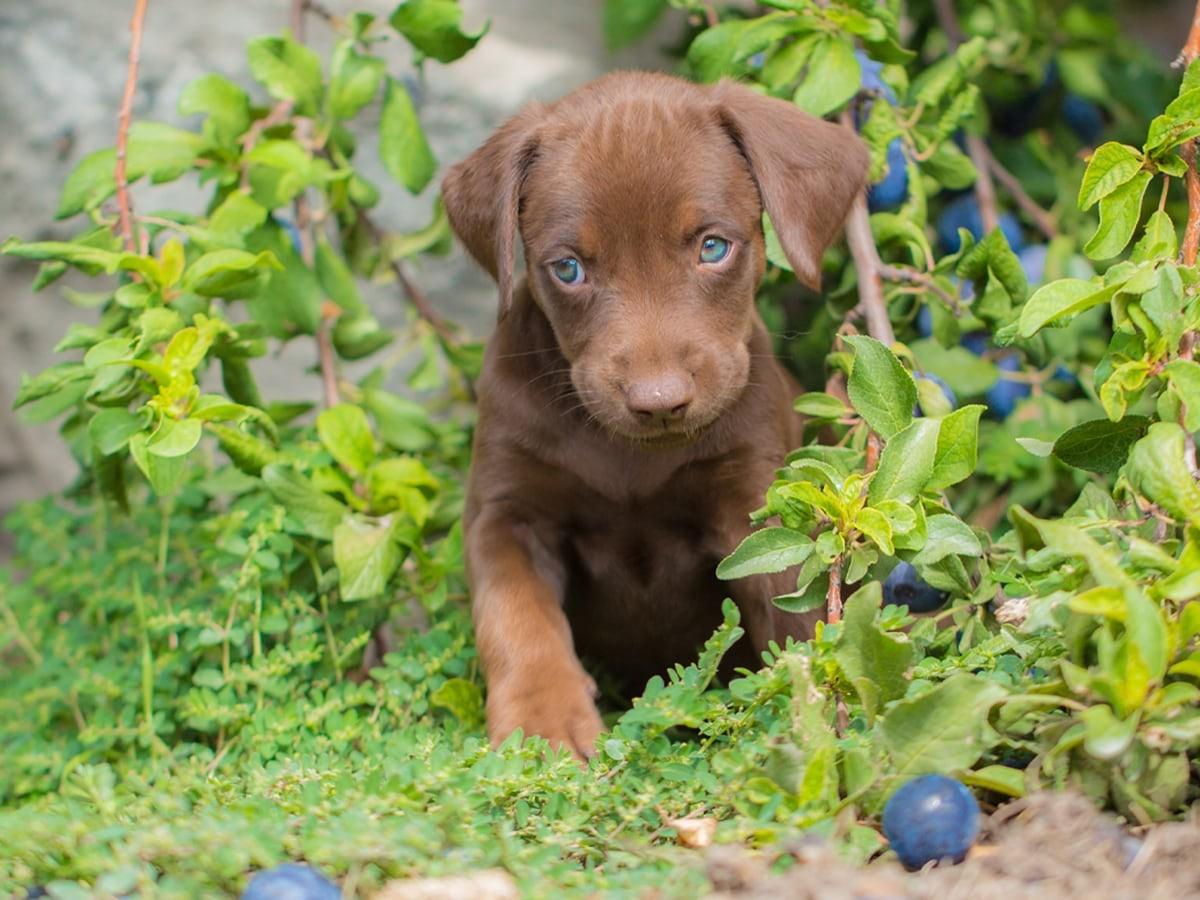Can My Dog Safely Eat Plums?
You’ve probably already chosen a nutritious, delicious dog food to be the main staple of your pet’s diet. This could be wet or dry food, brand-name or generic, or maybe you’re even choosing to feed your dog a raw-food diet that isn’t out of a bag or a can. Whatever it may be, you might also be wondering about supplemental foods to give them as a treat. Or maybe you simply want to pack away some tidbits in your knowledge base in case they get into something that you weren’t planning on offering.
Some foods are safe for dogs and can even be a healthy addition to their regular diet. However, some foods have properties that can cause a dog’s digestive system to go a little whacky or even be downright dangerous.
Plums might be one of the foods you’re wondering about. Can dogs have plums? Well, the answer for this fruit isn’t just black and white. Plum fruit isn’t inherently toxic to dogs, but several things need to be considered to ensure your furry friend’s safety when feeding them plums.
Plums – Sometimes Safe, Sometimes Dangerous
All stone fruits—not just plums but others such as peaches, nectarines, apricots, and cherries—contain pits that have cyanide in them. It’s not just the pits; the plum tree roots, stems, and leaves also contain this toxic compound. Even a small consumption requires a trip to the vet or a call to poison control.
Cyanide poisoning doesn’t just cause stomach upset and a day spent lying down. If it isn’t dealt with right away, cyanide can cause kidney failure, which can lead to death. The smaller your dog is, the more serious cyanide consumption becomes because even a tiny amount can lead to high levels of toxicity.
Interestingly enough, the pit is dangerous in this way only when chewed. The cyanide in the pit doesn’t create a toxic reaction in a dog if it’s swallowed whole because it can’t digest the stone. However, if your dog tries to swallow a plum stone, there’s another risk at hand: choking. If they manage to get it down their throat, it could get lodged further into their digestive tract, which would cause blockage and require surgery.
All that to be said, it’s best to keep plums out of your dog’s reach. However, if you do want to share the actual fruit flesh with them, that is considered to be safe. It’s also very high in vitamin C and a whole host of other valuable nutrients. Dried plums also contain plenty of dietary fiber, which is wonderful for encouraging a healthy digestive system.
Too much fruit in a dog’s diet, though, could lead to overconsumption of sugar. Too much sugar can create obesity or diabetes (and dried fruit, of course, contains higher sugar content than fresh). So, if you’re going to offer fruit as a training or behavioral reward or as an occasional dietary addition, use it in moderation or cut the rewards up into tiny pieces. If you have a dog that already has weight or blood sugar issues, opt for something natural that doesn’t have high sugar content.
What If My Dog Ate Plums?
If your dog was rummaging around in your groceries and ate a plum, skin, and all, it will probably be fine. You don’t need to rush out to the vet or make an appearance at the animal emergency center. Watch for signs of discomfort and give your dog plenty of fresh water and a place to easily defecate if they have diarrhea.
However, if your dog got into a big basket of plums that you just brought home from the farmer’s market, or if you have a plum tree that dropped an abundance of fruit when Fido was out in the yard, you might have more to worry about. Since the leaves, stems, and roots of plums and plum trees contain the toxic compound cyanide, you’ll need to call Animal Poison Control (888-426-4435) and/or go to your vet immediately.
If you have plum trees on your property, you don’t need to uproot them immediately. Just place a fence around that area and watch your dog carefully when they’re near that spot in your yard. Your vet might also recommend something to keep on hand in a dog first aid kit in case an accidental consumption occurs.
Other Fruits That Are Good for Dogs
If you want to share your love of fruit with your doggy, there are plenty of choices that are safe and sound all around. Furthermore, each choice on this list of dog-safe fruits has an abundance of vitamins, minerals, and healthy compounds that keep your dog energetic, agile, and looking its best.
Add some extras of these to your shopping list next time you head to the store. Then, when you’re cutting some up for your meals, you can portion out a few pieces to give to Fido when it’s time for a delicious treat.
Remember that dogs should never have grapes and raisins. Some other fruits, such as grapefruit, also have enzymes that could be toxic to dogs. Check with your veterinarian before trying any new food, and always watch for signs of pain, irritability, or digestive upset. It’s always best to try new food in small portions, too, so that if there is an adverse reaction, it’s small and will hopefully pass quickly. Dogs can be allergic to particular foods just like people, so that’s something to think about as well. We have compiled a big list of all the fruits your dogs should eat here.
Dogs can eat sweet potatoes and many other vegetables instead.
Choosing the Best Fruit
When you’re shopping for your fruit, you probably try to choose the freshest, most beautiful-looking pieces. Maybe you also try to always buy organic when it’s available.
Of course, this is a healthy decision because pesticides and other sprayed chemicals are detrimental to your health. They aren’t good for your dog, so choosing organic fruit for their treats is a great way to show them that you care and help them live a long and healthy life.
Dogs are known to eat many things that humans no longer find appetizing. Their systems break things down differently than ours, and they don’t have such sophisticated taste palates. However, this doesn’t mean you can pull out all your moldy, rotted fruit and just toss it to your dog. Indeed, all types of rotting fruit contain ethanol, which is toxic to dogs. So, if a plum or other fruit is a few days past when you’d like to eat it, it’s probably fine to cut it up for your pooch. However, if the fruit has begun to turn, just throw it out and choose a different one to share with your furry friend.
Conclusion
Your dog is your best furry friend. You want to give them everything you can to prolong and enhance their life and keep things away from them that could cause dangerous issues. Plum fruit is considered safe as an occasional treat, but remember to keep your pooch far away from the pit, leaves, stems, and tree roots.

The resident animal enthusiast at Spot. I have a lifetime of pet parent experience. If it has fur, feathers, or scales, I’ve probably shared my home with it. I aim to be a reliable source, blending experience with a dedication to the well-being of pets.
Saylor, April. "Can Dogs Eat Plums?" PetMD, 05 Jul. 2023, https://www.petmd.com/dog/nutrition/can-dogs-eat-plums.
"Plum Ingestion in Dogs: Is It an Emergency?" Garden State Veterinary Specialists, 02 May 2025, https://gsvs.org/blog/plum-ingestion-dogs-emergency/.
Koschalk, Katie. "Can Dogs Eat Plums?" Chewy, 30 Apr. 2025, https://www.chewy.com/education/dog/food-and-nutrition/nutrition-pet-diet-tips-can-dogs-eat-plums.
The information presented in this article is for educational and informational purposes only and does not constitute or substitute for the advice of your veterinarian.












